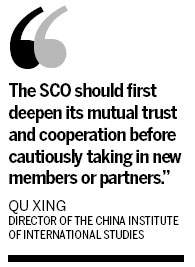Afghan, Turkish SCO ties sought
Updated: 2012-05-24 07:42
By Wu Jiao and Zhang Yunbi (Xinhua)
|
|||||||||||
Two countries with close ties to the West are keen to get closer to the Shanghai Cooperation Organization as it enhances its security and economic cooperation in a changing regional environment.
Deputy Foreign Minister Cheng Guoping said at a briefing in Beijing on Wednesday that the upcoming SCO summit, scheduled for June 6 and 7, will review applications from Afghanistan for observer status and from Turkey as a dialogue partner.
The SCO member countries will make a decision on the applications based on coordination and consensus, Cheng said.
|
 |
Both of the countries have closely interacted with the West, with Afghanistan hosting the US-led NATO anti-terrorism mission, and Turkey as a member of NATO.
Established in 2001, the SCO currently has Russia, China and four Central Asian countries - Kazakhstan, Kyrgyzstan, Tajikistan and Uzbekistan - as full members. India, Pakistan, Iran and Mongolia are observers, and Belarus and Sri Lanka are dialogue partners.
The bloc has been focusing on regional security and business cooperation.
Analysts said the interest shown by more countries in the SCO means that the number of world powers that recognize it as a serious player is growing.
But Qu Xing, director of the China Institute of International Studies, warned that the SCO should learn a lesson from the rapid expansion of the European Union, which gave rise to potential frictions within the bloc.
"Members might differ on the same topic. The SCO should first deepen its mutual trust and cooperation before cautiously taking in new members or partners."
The Voice of Russia quoted analyst Stanislav Tarasov as saying that the move with Turkey is a "real breakthrough".
"Turkey has been sticking to pro-Western policies. It has been trying to join the EU for 10 years, but it was in vain. So now it has to develop a new scenario of drifting to the east, which implies changes in Turkey's foreign policy," Tarasov said.
Ankara applied for dialogue partner status in October. Partner states are not entitled to take part in all SCO events and do not have access to the non-public documents of the organization.
Yao Kuangyi, former Chinese ambassador to Turkey, said Ankara is an active regional player and interacts with all SCO members.
"Turkey's participation will contribute to the security and stability of the Eurasian region," Yao said, adding that Turkey wants to expand its influence in the Central Asian region, with which it has a similar cultural background.
Afghanistan applied for observer status in April, against the backdrop of the US and NATO withdrawal from the country, which is planned to take place in 2014.
Cheng said internal issues in Afghanistan have affected regional security and stability, and the SCO will work with the United Nations to play a more active role in addressing Afghan-related issues, Cheng said.
Sun Zhuangzhi, a Central Asian Studies scholar at the Chinese Academy of Social Sciences, said Afghanistan's participation would strengthen the SCO's anti-drugs and anti-terrorism efforts.
The SCO has established a liaison group with Afghanistan and held six rounds of deputy-foreign-minister-level consultations on the issues.
The forthcoming SCO summit will adopt several major documents, which will guide and enhance cooperation in the organization amid a changing regional scenario.
According to Cheng, member countries will adopt a key development plan for the SCO, the first such development guideline in its history.
The SCO will also modify a 2009 foreign policy coordination mechanism that coordinates members' anti-crisis efforts, and approve a cooperation program to combat terrorism, separatism and extremism.
The summit will also see progress in building a transnational transportation network and speeding up the process of setting up a regional bank.
Russian Foreign Minister Sergey Lavrov said earlier this month that following the June SCO summit, the range of functions of the organization will be "significantly enhanced".
From now on, the SCO will formulate a unified policy for all its participants in case of crises in the region, said Lavrov.
Turbulence in the Middle East, the US withdrawal from Iraq, and the forthcoming completion of the US/NATO mission in Afghanistan demanded the SCO make due changes, said analysts.
Sun said this situation made the SCO members more aware of the previous shortcomings in terms of cooperation within the bloc.
The latest developments will have an immediate influence on SCO members' security cooperation, said Sun.
Putin's China visit
Russian President Vladimir Putin will visit China next month, a move that analysts said underscores the importance the current Russian leadership attaches to Moscow-Beijing ties.
Cheng said at Wednesday's briefing that Putin, who is due to attend the SCO summit in Beijing, will pay a state visit to China at that time.
China will be Putin's first destination outside the Commonwealth of Independent States, a group of former Soviet republics, since he was sworn in as Russian president earlier this month.
Liu Guchang, China's ambassador to Russia from 2003 to 2009, said Putin's visit is a prudent political arrangement that sends positive signals to the global community that China and Russia view each other as key partners.
Apart from bilateral ties, Liu said the Chinese and Russian leaders will focus their discussion on world and regional issues, especially in the Asia-Pacific region.
Liu also said the two countries will release a joint political declaration, showing their consensus on major world issues.
Contact the writers at wujiao@chinadaily.com.cn and zhangyunbi@chinadaily.com.cn
Today's Top News
President Xi confident in recovery from quake
H7N9 update: 104 cases, 21 deaths
Telecom workers restore links
Coal mine blast kills 18 in Jilin
Intl scholarship puts China on the map
More bird flu patients discharged
Gold loses sheen, but still a safe bet
US 'turns blind eye to human rights'
Hot Topics
Lunar probe , China growth forecasts, Emission rules get tougher, China seen through 'colored lens', International board,
Editor's Picks

|

|

|

|

|

|





